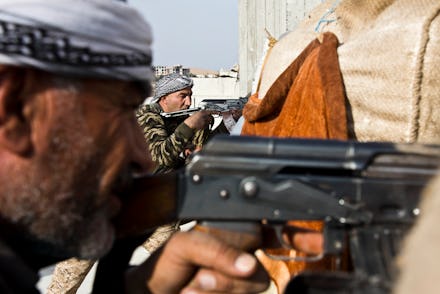The U.N. Has Accused the Islamic State of Genocide. What Happens Now?

On Thursday, the United Nations formally accused the Islamic State of war crimes, including genocide, against Iraq's minority Yazidi population. According to the U.N. report detailing the Islamic militants' crimes, the Islamic State group has tried "to destroy the Yazidi as a group."
The Christian religious minority from northern Iraq came to global attention in 2014 after the Islamic State group swept through the country, massacring hundreds. An even larger contingent of Yazidis became trapped by Islamic State fighters on Mount Sinjar, where a full-scale slaughter of men, women and children was likely averted only by direct U.S. intervention.
The report found that in areas where Yazidis have not able to escape, Yazidi men are "taken away to nearby ditches and summarily executed." Often, the executions are the result of a captive's refusal to convert to Islam. Much of the U.N. data came from Yazidis who had only survived by shielding themselves with the bodies of others.
The report also documents systemic and sexual violence toward women. Captured women and children are viewed as "spoils of war," and the group habitually sells women, who are then subject to "rape and sexual slavery." You can read the full report here.
The U.N. report has been a long time coming. Islamic State atrocities against Christians, LGBT people and other Muslims have been well documented. The U.N. report goes on to recommend that the government of Iraq should allow Islamic State fighters to be tried at the International Criminal Court in the Hague. That, however, is a lot easier said than done. While the ICC has 123 participating member states, Iraq isn't one of them. Despite continued pressure to join, the country has stalled, with at least one Iraqi official telling local sources that his country was not ready and would not be able to cope with the demands of membership.
Even if Iraq did join the court, the ICC's byzantine procedure and bureaucracy would likely keep proceedings going for years. As Kyle T. Jones noted in the National Interest, applications often take months to review, during which alleged war criminals typically remain at large. Too few judges, a preference for live testimony and cumbersome witness rules all hinder proceedings. Jean-Pierre Bemba, a former Congolese vice president accused of war crimes in the Central African Republic, has been on trial since 2010.
Iraq would be in no position to apprehend Islamic State leaders for transfer to the ICC. Much of the northern part of the country remains part of the group's de facto territory. The ICC, meanwhile, also has no practical way to act on their indictments. Many, ranging from Sudan's President Omar Bashir to terrorist kingpin Joseph Kony — yes, that Joseph Kony — have flaunted the charges brought against them.
While the United Nations report shines a welcome spotlight on the crimes of the Islamic State group, the world's focus should be on practical measures that can be taken to destroy the group.
The Islamic State group thrives amid chaos; it's no coincidence that they emerged during the Syrian civil war. Bringing an end to that four-year conflict, which has now resulted in an estimated 220,000 deaths, and restoring some measure of stability to the larger region will be the only way to end the Islamic State group once and for all. U.S. bombs alone have been unsuccessful because bombs cannot kill ideas. Bad ideas can only be defeated by better ones, and that is something the region, at present, lacks.